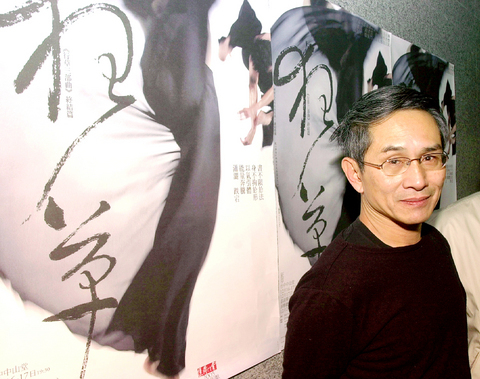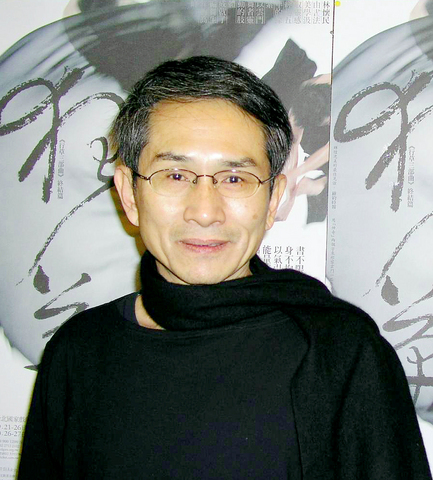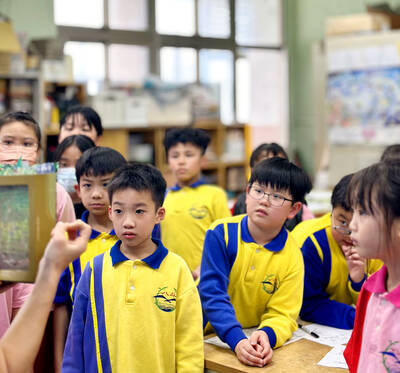The Cloud Gate Dance Theater (雲門舞集) started out in a studio above a Taiwanese noodle shop. Now, 33 years later, it's a world-renowned modern dance company with performances already booked into 2008.
The man who founded the company and still runs it, Lin Hwai-min (林懷民), said he has evolved over the years -- from a topdown choreographer who dictated the dancers' moves to a leader who collaborates with his performers. He said he now tries to draw the material from their movements.
``Everything comes from their bodies. Therefore, very organic,'' he said in an interview.

PHOTO: TAIPEI TIMES FILE
The former dancer and writer also said he became less rigid as he grew older.
``When I was young I thought things were clear-cut. Things had to be straightforward. Now I'm not this way,'' Lin said in a Hong Kong hotel room, where he sat barefoot, cross-legged on a sofa chair while clutching a pillow.
Cloud Gate has graced presti-gious stages like the Kennedy Center in Washington, DC, and Lin was named Choreographer of the 20th Century by Dance Europe magazine. Among his projects this year is a solo for French ballet star Sylvie Guillem, who performed with the Paris Opera Ballet and Royal Ballet of London.

Since founding Cloud Gate in 1973, Lin also set a goal of promoting modern dance in rural Taiwan. Today, he's almost synon-ymous with Chinese modern dance.
Lin, who turns 59 today, said he hasn't done any serious dance workouts since last performing some 23 years ago, but he still looks like a dancer: short, muscular, his robust torso stretching his black shirt.
Lin sprinkled English sentences and phrases into a mostly Chinese exchange, gesturing wildly when demonstrating a dance move.
He said Cloud Gate is in a rarefied state -- focusing on culti-vating the expressiveness of the body instead of telling stories through dance. The company has abandoned pure technical training in favor of encouraging dancers to gain full awareness of their bodies.
``Our teachers tell our students the human body is 90 percent water, so your movement has to resemble water, be as loose as water,'' Lin explained. Cloud Gate's instructors now encompass such varied disciplines as tai chi, martial arts, ballet and calligraphy.
Cloud Gate's latest work reflects its new philosophy. The Cursive trilogy is inspired by Chinese brush calligraphy.
In Cursive I, dancers in simple black costume perform kung fu-like moves on an undecorated stage in a flowing style, taking the ferocious edge off what resemble fighting routines. In one section, a cluster of performers kneel and rise up while raising their arms like hawks.
``It's not just about characters,'' Lin said of Chinese calligraphy. ``It's about the energy ... it has a very good rhythm and it's a sense of musical composition.''
But Lin points out that pure form must be backed up by strong fundamentals.
``If you're not strong in technique, you can be carried by the story, by costumes,'' but not in pure dance, Lin said.
Blending traditional Chinese elements and modern dance is Cloud Gate's trademark, largely the vision of Lin, a writer-turned-dancer educated in Taiwan and at the University of Iowa Writers' Workshop.
Fellow dancer Tom Brown said Lin is a rarity in the modern dance world in that he singularly devoted more than three decades to mold a group of dancers, whereas turnover and mobility is high in companies in the West and few choreographers command the focus of Lin.
The result is a very centered, physical style unique to Cloud Gate.
``European modern dance and even US modern dance quite often is about gesture. It's gesture-driven, if you will, and the thing that I find interesting about his work is that it's driven from something in the core of the body,'' said Brown, associate dean of dance at the Hong Kong Academy for Performing Arts.
Brown attributed Lin's appeal to his liberal arts training method.
``He gives them things to read. They have improvisation sections. They talk about painting,'' he said. ``Whether or not he pays them richly ... the experience itself is completely compelling and completely demanding.''
Despite Cloud Gate's status as a world-class company, Lin said finding funding is still a struggle. While the Taiwanese government chips in, Cloud Gate still needs to tour heavily to galvanize interest among potential donors.
``It's always a battle from New Year's Day to New Year's Eve,'' he said.
``Doing a good job running these three organizations (two dance companies and a dance school) only leaves me with half a life,'' Lin joked.

May 26 to June 1 When the Qing Dynasty first took control over many parts of Taiwan in 1684, it roughly continued the Kingdom of Tungning’s administrative borders (see below), setting up one prefecture and three counties. The actual area of control covered today’s Chiayi, Tainan and Kaohsiung. The administrative center was in Taiwan Prefecture, in today’s Tainan. But as Han settlement expanded and due to rebellions and other international incidents, the administrative units became more complex. By the time Taiwan became a province of the Qing in 1887, there were three prefectures, eleven counties, three subprefectures and one directly-administered prefecture, with

It’s an enormous dome of colorful glass, something between the Sistine Chapel and a Marc Chagall fresco. And yet, it’s just a subway station. Formosa Boulevard is the heart of Kaohsiung’s mass transit system. In metro terms, it’s modest: the only transfer station in a network with just two lines. But it’s a landmark nonetheless: a civic space that serves as much more than a point of transit. On a hot Sunday, the corridors and vast halls are filled with a market selling everything from second-hand clothes to toys and house decorations. It’s just one of the many events the station hosts,

Two moves show Taichung Mayor Lu Shiow-yen (盧秀燕) is gunning for Chinese Nationalist Party (KMT) party chair and the 2028 presidential election. Technically, these are not yet “officially” official, but by the rules of Taiwan politics, she is now on the dance floor. Earlier this month Lu confirmed in an interview in Japan’s Nikkei that she was considering running for KMT chair. This is not new news, but according to reports from her camp she previously was still considering the case for and against running. By choosing a respected, international news outlet, she declared it to the world. While the outside world

Through art and storytelling, La Benida Hui empowers children to become environmental heroes, using everything from SpongeBob to microorganisms to reimagine their relationship with nature. “I tell the students that they have superpowers. It needs to be emphasized that their choices can make a difference,” says Hui, an environmental artist and education specialist. For her second year as Badou Elementary’s artist in residence, Hui leads creative lessons on environmental protection, where students reflect on their relationship with nature and transform beach waste into artworks. Standing in lush green hills overlooking the ocean with land extending into the intertidal zone, the school in Keelung